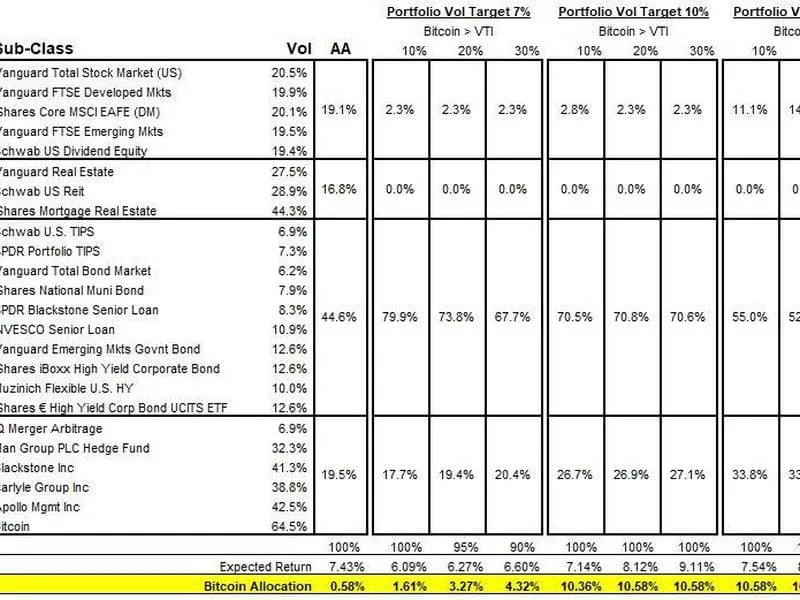Markus Thielen, CEO at 10x Research, spends his days researching digital assets and providing data-driven insights. I’m thrilled about his contribution to sharing a practical and unbiased approach to evaluating bitcoin allocation within a portfolio. Markus is the author of the book Crypto Titans: How trillions were made and billions lost in the cryptocurrency markets.
AJ Nary, head of HeightZero at BitGo, answers some questions that asset managers face when considering digital asset investments in the Ask an Expert section.
Happy reading.
– S.M.
You’re reading Crypto for Advisors, CoinDesk’s weekly newsletter that unpacks digital assets for financial advisors. Subscribe here to get it every Thursday.
Institutional Investors Embrace Bitcoin, Sacrifice Traditional Assets
Investors have continued to push into alternatives to optimize their portfolio allocations. A practical, unbiased and proven approach could classify bitcoin as another building block in institutional investors’ portfolios.
When Bill Gates became friends with Warren Buffett, the latter convinced him to diversify his wealth away from Microsoft. Gates owned 45% of the company after the IPO in 1986. Microsoft has a $3 trillion market capitalization today, and Gates’s ownership is just 1.38%. If he had held onto his original stake, his net worth would have been $1.35 trillion instead of $124 billion.
But not everybody is fortunate enough to have started one of the most valuable companies or can put all their eggs in one basket.
“Diversification is the only free lunch” available in financial markets, according to Nobel laureate Harry Markowitz.
Investing is often a function of the expected return and volatility of the assets in the investable universe to provide an optimal portfolio allocation. The result indicates the best allocation for a given expected return or volatility level.
Markowitz provided a practical method for selecting investments to maximize their overall returns within an acceptable level of risk, the so-called Modern Portfolio Theory (MPT). Fischer Black and Robert Litterman used the concepts of MPT and added investors’ views of expected returns. While MPT only uses historical market data and assumes the same returns in the future, the Black-Litterman model lets investors apply their opinions to it and optimizes the recommended asset allocation.
Instead of a narrow “60/40 portfolio,” pension funds, endowments and registered investment advisors (RIAs) can work with their clients, use the $400 trillion investable market portfolio and optimize allocations based on their expected returns and risk tolerance (volatility). The investable market portfolio includes equities, bonds and other fixed-income products such as loans, high-yield, municipal bonds, listed real estate (REITs) and alternatives, notably private equity and hedge funds.
Digital assets, as represented by bitcoin ETFs in secondary markets, account for a modest $1.6 trillion, but those bitcoin ETFs can diversify and optimize portfolio allocations further.
Ahead of other endowment funds, the late investor David Swensen standardized diversification through his Yale Model, which emphasizes diversification across various asset classes, focusing on alternative investments such as private equity, real estate, hedge funds and natural resources. Swensen revealed in 2018 that he had invested in two dedicated cryptocurrency funds. Although he passed away in 2021, with the listing of bitcoin spot ETFs in 2024, Yale Endowment’s asset allocation portfolio would have likely added bitcoin ETFs under his guidance.
Many institutional investors ask themselves which role bitcoin could play in their portfolios. The answer depends on historical returns, acceptable risk and expected returns relative to other assets, as we learned from Black-Litterman.
We standardize non-liquid investments in real estate through REITs, hedge funds and private equity exposure through listed alternatives, such as the UK-listed Man Group or the share performance of Blackstone, which allows us to structure liquid portfolios based on the three characteristics: historical returns, acceptable risk and expected returns.
A typical asset allocation model suggests 19.1% exposure to equities, 16.8% to real estate, 44.8% to fixed income and 19.5% to alternatives. In contrast, bitcoin would only account for 0.58% within the alternatives bucket based on its market capitalization.
Exhibit: Asset Class suggestion based on Black-Litterman Asset Allocation model if Bitcoin outperforms Stocks (Bitcoin>VTI) by 10%, 20% or 30% during the next year with Portfolio Volatility Targets of 7%, 10% or 12%.

Optimizing our Black-Litterman portfolio with a modest 7% volatility target, we notice that if our forward-looking assumption is that bitcoin outperforms the (US) Vanguard Total Stock Market Index (VTI) by +10% over the next year, then bitcoin’s allocation in institutional portfolios would increase from 0.58% to 1.61%. An outperformance of +20% or even +30% would warrant a bitcoin allocation of 3.27% and +4.32%, respectively.
Increasing our volatility target to 10% or even 12.5% suggests increasing bitcoin’s allocation towards a 10.36% to 10.58% portfolio-weighted position, depending on our bitcoin outperformance assumption. A growing bitcoin outperformance assumption sees a reduction in fixed-income assets and an increase in alternatives and stock allocations.
A higher risk tolerance pushes the expected returns to the right side of the return distribution while allocating out of fixed income and embracing an increased allocation into alternatives, including bitcoin.
Unsustainable debt levels and inflation unpredictability have many investors rethinking their fixed-income risk tolerance. Bitcoin has become part of the legitimate investable universe through the ETF listings, and our Black-Litterman portfolio optimization shows that depending on investors’ portfolio volatility targets and return expectations, portfolios could allocate between 1.61% to 10.58% of their assets into Bitcoin.
Exhibit 2: Global Investable Portfolio Weights and Black-Litterman Simulation (2)

– Markus Thielen, CEO, 10x Research
Ask an Expert:
Q: What should asset managers consider as they explore adding digital assets?
A: The SEC’s approval of spot bitcoin ETFs in January has provided asset managers with a unique opportunity to begin introducing digital assets into their portfolios. As they work to create a disciplined approach to investing in digital assets, it would be wise to consider the following:
- Direct vs. indirect exposure – weigh the benefits and limitations of holding Bitcoin directly or utilizing ETFs. Consider fee structures, liquidity, potential tax impacts and alignment with portfolio objectives, to start
- Diversification – analyze the impact of investing in one digital asset vs. multiple, on top of the overall impacts that digital assets will have to your existing strategy
- Ongoing research and monitoring – develop a comprehensive framework to stay ahead of regulatory developments, market dynamics and emerging trends within the digital asset space
- External education and communication – proactively educate clients/investors about the benefits and challenges of digital assets while also managing their expectations
Q: What role do you envision broader digital assets playing for asset managers moving forward?
A: The evolving digital asset landscape offers exciting possibilities for portfolio construction and diversification, spot bitcoin ETFs were just the beginning. There are other assets beyond bitcoin, such as ether or stablecoins, that may also have potential applications within investment strategies. Asset managers that want to get ahead of that may consider direct investment versus waiting for SEC approval of other ETFs. Bitcoin correlation between asset classes changes over time and could be a valuable complement to a portfolio’s other asset exposure.
Q: What should asset managers know about direct investing and what should they look for in a digital asset partner/platform?
A: A crucial aspect of direct investment is picking the right partner and platform that will ensure the safety and security of your digital assets. Asset managers should first and foremost look for a qualified custodian to hold their assets and mitigate risk. They should also ensure that there is a robust platform to help them seize market opportunities and adapt to market dynamics.
– AJ Nary, head of HeightZero @ BitGo, BitGo
Keep Reading
Bitget’s recent global survey of crypto investors showed high optimism for 2024.
The saga of FTX is coming to a conclusion; the bankrupt exchange expects to pay all customers back in full.
Forbes provides a snapshot of the crypto market on the heels of the U.S. spot bitcoin ETF approvals in their February 2024 Market Forecast.













Got a Questions?
Find us on Socials or Contact us and we’ll get back to you as soon as possible.